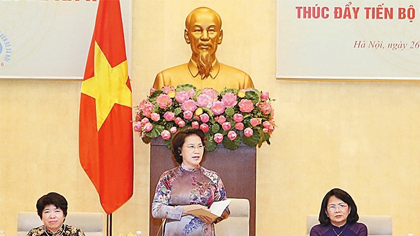Seminar highlights NA committee's role in promoting social equality
A seminar took place in Hanoi on June 26 to discuss relations of the National Assembly (NA) Committee for Social Affairs (NACSA) with policies and legal regulations to promote social advancement and equality.
 |
| NA Chairwoman Nguyen Thi Kim Ngan speaking at the seminar (Credit: VNA) |
The seminar saw the presence of NA Chairwoman Nguyen Thi Kim Ngan and Vice President Dang Thi Ngoc Thinh.
Opening the seminar, NACSA Chairwoman Nguyen Thuy An reviewed the committee’s establishment at the first session of the sixth tenure NA on July 2, 1976. With unceasing efforts and resolution, the committee has helped build a legal system related to labour, employment, social welfare, health care, population and policies to take care of contributors as well as foster gender equality, which have contributed to elevating the effectiveness of the implementation of policies and ensuring social welfares.
Addressing the seminar, NA Chairwoman Ngan affirmed the NACSA’s role and contributions to the country’s significant accomplishments in developing the social policy institution.
She stressed that from the beginning of the doi moi process, the Party and the State have always paid great attention to social affairs and affirmed that the NACSA has intensified efforts and built up a tradition of dynamism, creativeness, collectiveness and unceasing innovation, contributing to boosting the doi moi process, expanding the NA’s democratic activities and gaining voters’ trust.
The top legislator expressed her belief that the NACSA will continue to reap accomplishments and promote values of social advancement and equality in national industrialisation and modernisation and international integration.
At the seminar, delegates discussed and evaluated the NACSA’s development and experiences over the past 40 years, as well as policies and legal regulations on labour and poverty reduction with a focus on innovation and orientation of poverty reduction policies in the future in order to meet requirements of the market economy, the international integration process and commitments in the Trans-Pacific Partnershhip agreement.
(Source: NDO)
 về đầu trang
về đầu trang







